Food risks during pregnancy

Pregnancy is the phase of a woman, in which a fetus can develop day by day in her uterus. Usually, it continues for over 9 months. During this phase, a pregnant woman needs good nutrition for both herself and her fetus. Nutritional requirements for a pregnant woman is much higher than for a normal woman.
During pregnancy, women may suffer from a low immune system. Thus, they have a greater risk of acquiring foodborne infection caused by bacteria or parasites. Miscarriage, premature delivery or even death can occur from foodborne diseases.
Bacteria and parasites involved in food poisoning during pregnancy:
A few examples of the most common bacteria and parasites involved in food poisoning of pregnant women are discussed below:
Listeriosis:
- It is caused by Listeria monocytogenes, a bacterium found in soil and water.
- It can also be found in vegetables, meats, dairy products, and some processed foods.
- Fever, muscle aches, nausea, vomiting diarrhea, headache, convulsion, flu-like illness are common symptoms.
- This type of bacteria can cause miscarriages, premature babies or infant death.
Campylobacter:
- During pregnancy, campylobacter infection (campylobacteriosis) with an organism called campylobacterjejuni, is a very common infection.
- C. jejuni is found in the intestinal tract of animals (especially chicken), untreated water, raw (unpasteurized) milk, poultry, etc.
- Diarrhea, nausea, vomiting, muscle cramp, fever are common symptoms during this infection.
- This type of bacteria can cause miscarriages and premature birth at an early stage. If the mother suffers from neonatal sepsis during the third trimester, the bacterium can be transmitted to the baby during delivery.
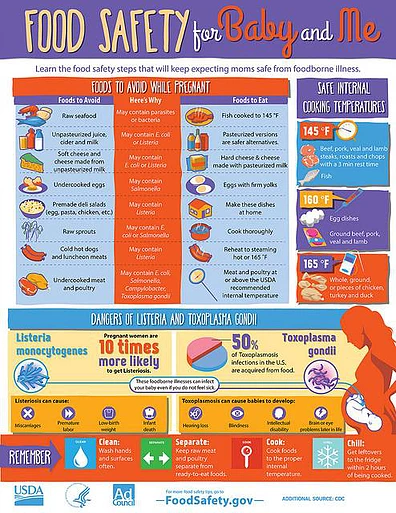
Escherichia coli (E. coli):
- E. coli are the group of bacterium that lives in the colon (gut/intestine) and vagina.
- During pregnancy, if a woman is infected by E.coli, she can suffer from diarrhea. Due to diarrhea, the body eliminates lots of water, so the woman becomes dehydrated.
- In rare cases, with severe E. coli infection, the patient may start to bleed heavily, which can cause miscarriage, premature baby or stillbirth.
- Stomach pain, fever, diarrhea, vomiting are common symptoms.
- E. coli may cause by eating raw, unwashed fruits, vegetables, unpasteurized milk, raw and uncooked meat, drinking and swimming in infected water.
Salmonella:
- During pregnancy, women can also be affected by Salmonella. In this infection, the patient can suffer from dehydration bacteremia (bacteria in the blood) which can lead to meningitis. In rare cases, Salmonella can also affect the fetus.
- Abdominal pain, diarrhea, fever, nausea, vomiting, headache, muscle pain blood in stool are common symptoms during this infection.
- It is found mainly in egg, poultry, meat, fish, raw dairy product, etc.
Toxoplasma gondii:
- Toxoplasmagondii is a microscopic parasite, which can cause toxoplasmosis. During pregnancy, the parasite can also affect the placenta and unborn baby.
- During this infection, the baby can suffer from blindness, hearing loss, jaundice, pneumonia, intellectual disabilities.
- Cat faces, uncooked meat, contain this type of parasite. Contaminated fruits and vegetables can also affect pregnant women if consumed raw.
Foods avoid during pregnancy:
-
Raw uncooked fish
-
Seafood
-
Raw fruits and vegetables
-
Raw (unpasteurized) milk
-
Cheese made by unpasteurized
-
Raw shellfish
-
Unpasteurized juice
-
Raw sprouts
Precaution to avoid food poisoning during pregnancy:
-
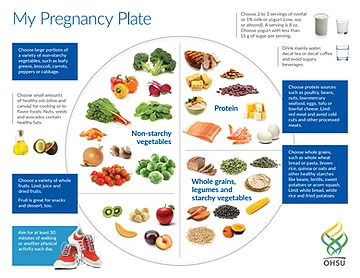 Personal hygiene
Personal hygiene -
cooked vegetables properly
-
avoid raw food intake
-
When food kept in the refrigerator make sure the cooling system is ok
-
Pasteurized milk and juice should be consumed
-
Fast food, junk food should be avoided
-
Take lots of good water to avoid dehydration
-
Maintain proper temperature for cooking
-
Prevent contamination always wash hands before taking a meal.
Myths during pregnancy:
During pregnancy, people are concerned about the health of women, especially during the first pregnancy. During this phase, people give a lot of suggestions to pregnant women for her and her baby’s health. Some of these suggestions might be true and some might not be.
Some common food-related myths during pregnancy in India:
-
Avoid papaya: Unripe or semi-ripe papaya contain latex, which can cause abortion during the early stage of pregnancy, so it can be avoidable but ripe papaya is excellent for pregnancy because it contains vitamin C and some other nutrients which helps to prevent constipation.
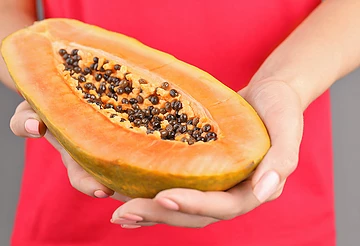
-
Avoid caffeine: Coffee contains caffeine. Caffeine increases high blood pressure and heart rate, which affect pregnancy. Studies show that a pregnant woman can consume less than 200 mg of caffeine per day.
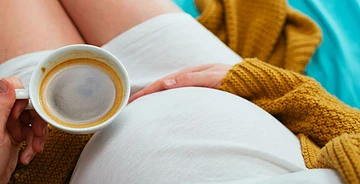
In the study of The American Journal of Obstetrics and Gynecology, a pregnant woman who consume 200 mg or more caffeine daily higher chances of miscarriage compared to a non-consumer. Therefore, better to avoid it, and one or two small cups of coffee are acceptable.
-
Spicy food should be avoided: This statement is not completely true. During the early stage of pregnancy, some woman suffers from heartburn, gas formation, vomiting, etc. During this phase, spicy food should be avoided for easy digestion. Otherwise, a pregnant woman can consume a moderate amount of homemade spicy food which also adds variation in diet.
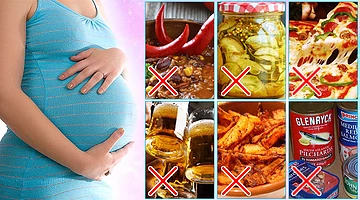
-
Increase food intake: Some people think during pregnancy food intake must be increased. It`s not completely true. A proper nutritional diet or a balanced diet must be followed during this phase.
Advice:
It can be concluded that some awareness, some precautions, some basic knowledge help to prevent foodborne diseases during pregnancy. A pregnant woman can take most of the food in a healthy way, which is good for both of her and the fetus. In Mom Loves Best, you can also get some additional tips to keep you healthy during pregnancy. Lastly, during pregnancy, it will be better to consult with a dietitian or nutritionist for proper dietary guidelines according to the health conditions.
References:
1. https://en.wikipedia.org/wiki/Pregnancy#Nutrition
2. https://www.foodsafety.gov/risk/pregnant/index.html
3. https://wa.kaiserpermanente.org/kbase/topic.jhtml?docId=ug2967
4. https://www.babymed.com/campylobacter-infection-during-pregnancy
6. http://americanpregnancy.org/pregnancy-health/caffeine-intake-during-pregnancy/
7. https://www.nestle.in/nhw/healthy-living/pregnancy/pregnancy-myths



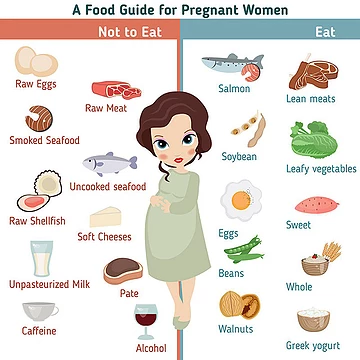
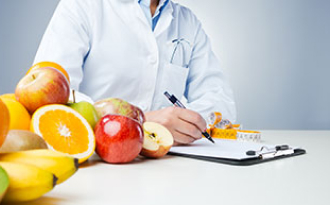


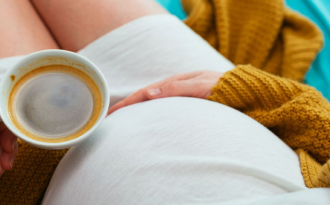



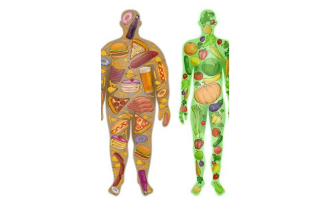

0 Comments